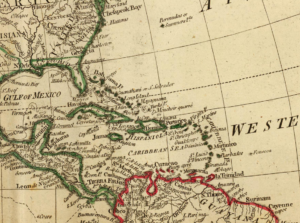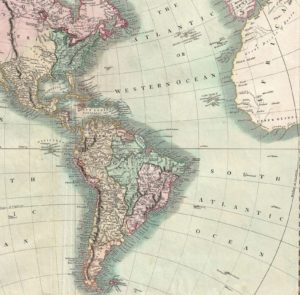CURRENT RESEARCH
I am especially interested in the history of the late-eighteenth and early nineteenth centuries, a period when imperial conflict, emancipation and the abolition of slavery transformed former colonies into nation-states during the Atlantic World’s Age of Revolutions. My scholarship centers on colonial Latin America, vast early America, the Spanish Caribbean, and, chiefly, the connected history of the Americas. For this reason, the subjects of my research are Atlantic trade and commerce, slavery and emancipation, imperial margins and frontiers, environmental history, migration and globalization, and cross-cultural relations broadly defined.
What most intrigues me are the trans-local linkages that defied historical boundaries–ones that were otherwise supposed to separate people by nation, religion, race, class, or gender. I am curious about discreet locales that were tied together despite being separated by distance, geography, or the passage of time. This has led me to search for how to understand the past in a way that relies on detailed study of the “local” while also highlighting our human responses to the realities of trans-local or trans-national ties. I’m interested in how to write the history of a knotted past.
BOOKS
Sustaining Empire: Venezuela’s Trade with the United States during the Age of Revolutions, 1797-1828
Available now from the Johns Hopkins University Press
https://jhupbooks.press.jhu.edu/title/sustaining-empire
Description: From 1790 to 1815, much of the Atlantic World was roiled by European imperial wars. While the citizens of the United States profited from the waste of blood and treasure, Spanish American colonists struggled to preserve their prosperity on an imperial periphery. Along the Caribbean coast of South America, colonial elites and officials fought to secure Venezuela from threats of foreign invasion, slave rebellion, and revolution. For these elites, trading with the United States and other neutral nations was not a way to subvert colonial rule but to safeguard the prosperity and happiness of loyal subjects of the Spanish Crown. Food insecurity, deprivation, and political uncertainty left Venezuela vulnerable to revolution, however.
In Sustaining Empire, Edward P. Pompeian lets readers see liberal free trade just as colonial Venezuelans did. From the vantage point of the slave-holding elite to which revolutionary figures like Simón Bolívar belonged, neutral commerce was a valuable and effectual way to conserve the colonial status quo. But after Spain’s crisis of sovereignty in 1808, it proved an impediment to Venezuelan independence. Analyzing the diplomatic and economic linkages between the new US republic and revolutionary Latin American governments, Pompeian reminds us that the United States did not, and does not, exist in a vacuum, and that the historic relationships between nations mattered then and matters now.
Examining an overlooked region, Pompeian offers a novel interpretation of early United States relations with Latin America, showing how US merchants executed government contracts and established flour, tobacco, and slave trading monopolies that facilitated the maintenance of colonial rule and the Spanish Empire. Trading with the United States, Pompeian argues, kept both colony and empire under a tenuous hold despite revolutionary circumstances. A fascinating revisionist history, Sustaining Empire challenges long-standing assertions that this commerce served primarily as a vector for the one-way transmission of revolutionary, liberal ideas from the North to South Atlantic.
REVIEWS
“The depth and quality of Edward Pompeian’s archival research is stunning. Moreover, his detailed material approach has the potential to make Sustaining Empire a field-shifting work. This volume sheds new light on the complex, sometimes counterintuitive relationships between US merchants and the Spanish colonial government in Venezuela.” — Ronald Briggs, Barnard College, author of The Moral Electricity of Print: Transatlantic Education and the Lima Women’s Circuit, 1876–1910
ESSAYS AND JOURNAL ARTICLES

“The Colossus of the North: The Iberian Empires and the United States, 1776-1823” appears in the The Routledge History of U.S. Foreign Relations edited by Tyson Reeder (2022)

“Mind the Global U-Turn: Reorienting Early American History in a Global and Commercial Context,” is found in the Winter 2016 special issue of the Journal of the Early Republic